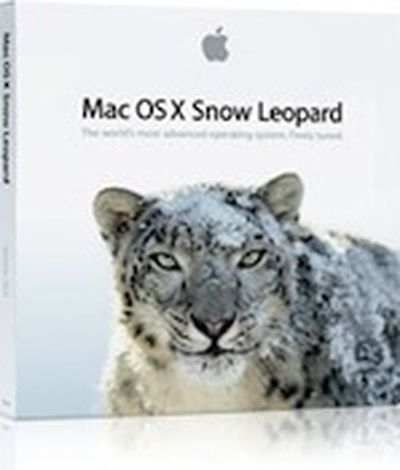Apple's Focus on iPhone OS 4 Diverting Resources From Mac OS X 10.7?

As part of a lengthy post discussing Apple's nearly singular focus on iPhone OS 4 over the past few months, Daring Fireball's John Gruber reports that he is hearing that resources have been diverted from the Mac OS X team to the iPhone OS team. Consequently, Gruber offers an "educated guess" that Mac OS X 10.7 may not be introduced to developers until mid-2011.
A few months ago, I heard suggestions that Apple had tentative plans to release a developer beta of Mac OS X 10.7 at WWDC this June. That is no longer the case. Mac OS X 10.7 development continues, but with a reduced team and an unknown schedule. It's my educated guess that there will be no 10.7 news at WWDC this year, and probably none until WWDC 2011.
Evidence of Apple's work on Mac OS X 10.7 surfaced last November. By January when Gruber reported that he was hearing of a possible developer release for Mac OS X 10.7 at Apple's Worldwide Developers Conference 2010, usage of the next-generation operating system already seemed to be on the rise within Apple's campus.
The time between major Mac OS X releases has been increasing as the operating system matures, with a nearly 30-month gap between Tiger and Leopard being followed by a 22-month wait for Snow Leopard, which Apple positioned primarily as a refinement of Leopard. With Mac OS X Snow Leopard having been released less than eight months ago, it would not be surprising to see Mac OS X 10.7 not make its public debut until late 2011 or beyond, even without iPhone OS 4 putting pressure on development.
Popular Stories
Apple is developing a MacBook with the A18 Pro chip, according to findings in backend code uncovered by MacRumors.
Earlier today, Apple analyst Ming-Chi Kuo reported that Apple is planning to launch a low-cost MacBook powered by an iPhone chip. The machine is expected to feature a 13-inch display, the A18 Pro chip, and color options that include silver, blue, pink, and yellow.
MacRumors...
Apple's next-generation iPhone 17 Pro and iPhone 17 Pro Max are less than three months away, and there are plenty of rumors about the devices.
Apple is expected to launch the iPhone 17, iPhone 17 Air, iPhone 17 Pro, and iPhone 17 Pro Max in September this year.
Below, we recap key changes rumored for the iPhone 17 Pro models:Aluminum frame: iPhone 17 Pro models are rumored to have an...
In 2020, Apple added a digital car key feature to its Wallet app, allowing users to lock, unlock, and start a compatible vehicle with an iPhone or Apple Watch. The feature is currently offered by select automakers, including Audi, BMW, Hyundai, Kia, Genesis, Mercedes-Benz, Volvo, and a handful of others, and it is set to expand further.
During its WWDC 2025 keynote, Apple said that 13...
Apple hasn't updated the AirPods Pro since 2022, and the earbuds are due for a refresh. We're counting on a new model this year, and we've seen several hints of new AirPods tucked away in Apple's code. Rumors suggest that Apple has some exciting new features planned that will make it worthwhile to upgrade to the latest model.
Subscribe to the MacRumors YouTube channel for more videos.
Heal...
Apple is planning to launch a low-cost MacBook powered by an iPhone chip, according to Apple analyst Ming-Chi Kuo.
In an article published on X, Kuo explained that the device will feature a 13-inch display and the A18 Pro chip, making it the first Mac powered by an iPhone chip. The A18 Pro chip debuted in the iPhone 16 Pro last year. To date, all Apple silicon Macs have contained M-series...
Popular accessory maker Anker this month launched two separate recalls for its power banks, some of which may be a fire risk.
The first recall affects Anker PowerCore 10000 Power Banks sold between June 1, 2016 and December 31, 2022 in the United States. Anker says that these power banks have a "potential issue" with the battery inside, which can lead to overheating, melting of plastic...
Chase this week announced a series of new perks for its premium Sapphire Reserve credit card, and one of them is for a pair of Apple services.
Specifically, the credit card now offers complimentary annual subscriptions to Apple TV+ and Apple Music, a value of up to $250 per year.
If you are already paying for Apple TV+ and/or Apple Music directly through Apple, those subscriptions will...
As part of its 10-year celebrations of Apple Music, Apple today released an all-new personalized playlist that collates your entire listening history.
The playlist, called "Replay All Time," expands on Apple Music's existing Replay features. Previously, users could only see their top songs for each individual calendar year that they've been subscribed to Apple Music, but now, Replay All...
Apple's next-generation iPhone 17 Pro and iPhone 17 Pro Max are around three months away, and there are plenty of rumors about the devices.
Apple is expected to launch the iPhone 17, iPhone 17 Air, iPhone 17 Pro, and iPhone 17 Pro Max in September this year.
Below, we recap key changes rumored for the iPhone 17 Pro models:Aluminum frame: iPhone 17 Pro models are rumored to have an...























